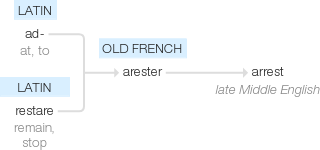Arrest
late Middle English: from Old French arester, based on Latin ad- ‘at, to’ + restare ‘remain, stop’.
wiktionary
From Middle English arest(noun) and aresten(verb), from Old French areste(noun) and arester(“to stay, stop”, verb), from Vulgar Latin *arrestō, from Latin ad-(“to”) + restō(“to stop, remain behind, stay back”), from re-(“back”) + stō(“to stand”), from Proto-Indo-European *steh₂-(“to stand”), equivalent to ad- + rest. Compare French arrêter(“to stop”).
etymonline
arrest (v.)
"to cause to stop," also "to detain legally," late 14c., from Old French arester "to stay, stop" (12c., Modern French arrêter), from Vulgar Latin *arrestare "to stop, restrain" (source also of Italian arrestare, Spanish and Portuguese arrestar), from ad "to" (see ad-) + Latin restare "to stop, remain behind, stay back," from re- "back" (see re-) + stare "to stand" (from PIE root *sta- "to stand, make or be firm"). Figurative sense of "to catch and hold" (the attention, etc.) is from 1814.
arrest (n.)
"act of stopping; state of being stopped," late 14c., from Anglo-French arest, Old French areste (n.) "stoppage, delay" (12c., Modern French arrêt), from arester "to stay, stop" (see arrest (v.)). Especially in law, "the taking of a person into custody, usually by warrant from authority, to answer an alleged or suspected crime" (early 15c.).
